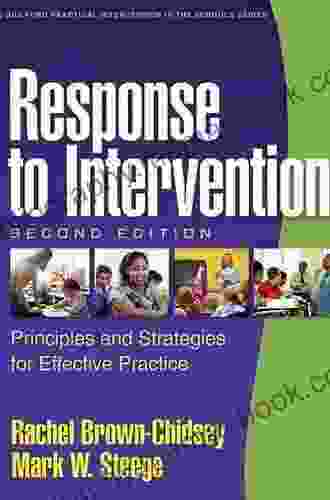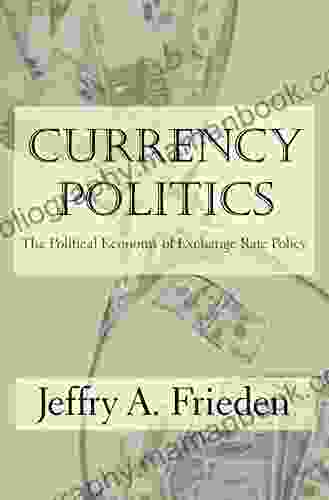The Political Economy Of Exchange Rate Policy: A Long-Term Perspective

4.5 out of 5
| Language | : | English |
| File size | : | 2730 KB |
| Text-to-Speech | : | Enabled |
| Screen Reader | : | Supported |
| Enhanced typesetting | : | Enabled |
| Word Wise | : | Enabled |
| Print length | : | 310 pages |
Exchange rate policy is a key component of macroeconomic policy, and it has a significant impact on a country's economic performance. The choice of exchange rate regime can affect inflation, growth, and employment. It can also have a major impact on the distribution of income and wealth.
The political economy of exchange rate policy is complex, and it involves a variety of economic, political, and social factors. These factors include:
- The balance of payments
- The level of inflation
- The exchange rate expectations of market participants
- The political ideology of the government
- The interests of various economic groups
The balance of payments is a key factor in exchange rate policy. A country with a large current account deficit is more likely to experience a depreciation of its currency. This is because a current account deficit means that the country is importing more goods and services than it is exporting. This leads to an increase in the supply of the country's currency on the foreign exchange market, which puts downward pressure on the exchange rate.
The level of inflation is another important factor in exchange rate policy. A country with high inflation is more likely to experience a depreciation of its currency. This is because high inflation erodes the purchasing power of the country's currency, making it less attractive to foreign investors. As a result, there is a decrease in the demand for the country's currency on the foreign exchange market, which puts downward pressure on the exchange rate.
The exchange rate expectations of market participants can also have a significant impact on exchange rate policy. If market participants expect the currency to depreciate, they will be more likely to sell the currency, which will put downward pressure on the exchange rate. Conversely, if market participants expect the currency to appreciate, they will be more likely to buy the currency, which will put upward pressure on the exchange rate.
The political ideology of the government can also play a role in exchange rate policy. Governments with a strong commitment to free markets are more likely to adopt a floating exchange rate regime. This is because a floating exchange rate regime allows the market to determine the value of the currency, which is consistent with the principles of free markets.
The interests of various economic groups can also influence exchange rate policy. For example, exporters are typically in favor of a weak currency, as this makes their goods and services more competitive in foreign markets. Importers, on the other hand, are typically in favor of a strong currency, as this makes their imports cheaper.
The political economy of exchange rate policy is a complex and dynamic field. The factors that influence exchange rate decisions are constantly changing, and the optimal exchange rate regime for a country will vary depending on its specific circumstances.
In recent years, there has been a growing interest in the long-term effects of exchange rate policy. This is because the short-term effects of exchange rate policy are often well understood, but the long-term effects are less well known.
Research on the long-term effects of exchange rate policy has found that a sustained depreciation of the currency can lead to higher inflation, lower growth, and increased inequality. This is because a depreciation of the currency makes imports more expensive, which can lead to higher inflation. It can also make it more difficult for businesses to compete in foreign markets, which can lead to lower growth. Finally, a depreciation of the currency can lead to an increase in inequality, as it benefits exporters and hurts importers.
The long-term effects of exchange rate policy are an important consideration for policymakers. When making decisions about exchange rate policy, policymakers should take into account not only the short-term effects, but also the long-term effects.
The political economy of exchange rate policy is a complex and challenging field. However, by understanding the factors that influence exchange rate decisions, policymakers can make better decisions about exchange rate policy and promote economic growth and stability.
4.5 out of 5
| Language | : | English |
| File size | : | 2730 KB |
| Text-to-Speech | : | Enabled |
| Screen Reader | : | Supported |
| Enhanced typesetting | : | Enabled |
| Word Wise | : | Enabled |
| Print length | : | 310 pages |
Do you want to contribute by writing guest posts on this blog?
Please contact us and send us a resume of previous articles that you have written.
 Top Book
Top Book Novel
Novel Fiction
Fiction Nonfiction
Nonfiction Literature
Literature Paperback
Paperback Hardcover
Hardcover E-book
E-book Audiobook
Audiobook Bestseller
Bestseller Classic
Classic Mystery
Mystery Thriller
Thriller Romance
Romance Fantasy
Fantasy Science Fiction
Science Fiction Biography
Biography Memoir
Memoir Autobiography
Autobiography Poetry
Poetry Drama
Drama Historical Fiction
Historical Fiction Self-help
Self-help Young Adult
Young Adult Childrens Books
Childrens Books Graphic Novel
Graphic Novel Anthology
Anthology Series
Series Encyclopedia
Encyclopedia Reference
Reference Guidebook
Guidebook Textbook
Textbook Workbook
Workbook Journal
Journal Diary
Diary Manuscript
Manuscript Folio
Folio Pulp Fiction
Pulp Fiction Short Stories
Short Stories Fairy Tales
Fairy Tales Fables
Fables Mythology
Mythology Philosophy
Philosophy Religion
Religion Spirituality
Spirituality Essays
Essays Critique
Critique Commentary
Commentary Glossary
Glossary Bibliography
Bibliography Index
Index Table of Contents
Table of Contents Preface
Preface Introduction
Introduction Foreword
Foreword Afterword
Afterword Appendices
Appendices Annotations
Annotations Footnotes
Footnotes Epilogue
Epilogue Prologue
Prologue Anthony Bourdain
Anthony Bourdain Dona Fox
Dona Fox Ariel Lawhon
Ariel Lawhon Bill Marvel
Bill Marvel Khadijah Queen
Khadijah Queen Daniel Jesse
Daniel Jesse Melissa Broder
Melissa Broder Chijioke Oguaju
Chijioke Oguaju Marlene Habib
Marlene Habib Charlie A Beckwith
Charlie A Beckwith Johann David Wyss
Johann David Wyss Caterina Christakos
Caterina Christakos Peggy L Henderson
Peggy L Henderson Marit Dewhurst
Marit Dewhurst Marshall Croddy
Marshall Croddy Amber Nicole
Amber Nicole Heinrich Von Kleist
Heinrich Von Kleist The Junior League Of Tampa
The Junior League Of Tampa Sarah Hazell
Sarah Hazell William Alan Webb
William Alan Webb
Light bulbAdvertise smarter! Our strategic ad space ensures maximum exposure. Reserve your spot today!
 Fernando PessoaVintage Fashion Couture: An Exploration of Iconic Designers from Poiret to...
Fernando PessoaVintage Fashion Couture: An Exploration of Iconic Designers from Poiret to...
 Edgar CoxThe Ultimate Self-Publishing Guide for Writers: Empowering Authors to Achieve...
Edgar CoxThe Ultimate Self-Publishing Guide for Writers: Empowering Authors to Achieve... Chase MorrisFollow ·19.5k
Chase MorrisFollow ·19.5k Raymond ChandlerFollow ·19.4k
Raymond ChandlerFollow ·19.4k Walt WhitmanFollow ·7k
Walt WhitmanFollow ·7k Aron CoxFollow ·14.3k
Aron CoxFollow ·14.3k Denzel HayesFollow ·18.4k
Denzel HayesFollow ·18.4k Herman MelvilleFollow ·5.2k
Herman MelvilleFollow ·5.2k Sidney CoxFollow ·13.7k
Sidney CoxFollow ·13.7k Jesse BellFollow ·3.9k
Jesse BellFollow ·3.9k

 Patrick Rothfuss
Patrick RothfussHow to Make a Million Dollars: No Secrets
Making a million dollars...

 Robert Heinlein
Robert HeinleinResponse to Intervention, Second Edition: RTI in Practice
A Comprehensive Resource for Educators and...

 Timothy Ward
Timothy WardUnravel the Gripping Assassination Thriller Bursting with...
Prepare yourself for a...
4.5 out of 5
| Language | : | English |
| File size | : | 2730 KB |
| Text-to-Speech | : | Enabled |
| Screen Reader | : | Supported |
| Enhanced typesetting | : | Enabled |
| Word Wise | : | Enabled |
| Print length | : | 310 pages |














